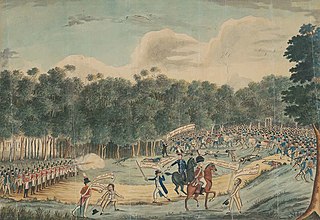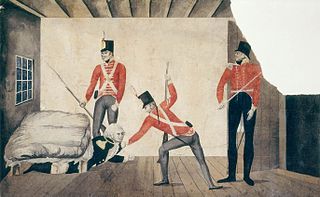 W
WThe American Revolutionary War, also known as the Revolutionary War or the American War of Independence, was initiated by delegates from thirteen American colonies of British America in Congress against Great Britain over their objection to Parliament's taxation policies and lack of colonial representation. From their founding in the 1600s, the colonies were largely left to govern themselves. The cost of victory in the 1754 to 1763 French and Indian War and the 1756 to 1763 Seven Years' War left the British government deeply in debt; the colonies, where the war was fought, equipped and populated the British forces there at the cost of millions of their own funds. The Stamp Act and Townshend Acts provoked colonial opposition and unrest, leading to the 1770 Boston Massacre and 1773 Boston Tea Party. When Parliament imposed the Intolerable Acts in spring 1774 upon Massachusetts, twelve colonies sent delegates to the First Continental Congress to draft a Petition to the King and organize a boycott of British goods.
 W
WBacon's Rebellion was an armed rebellion held by Virginia settlers that took place from 1675 to 1676. It was led by Nathaniel Bacon against Colonial Governor William Berkeley. It was the first rebellion in the North American colonies in which discontented frontiersmen took part. The alliance between European indentured servants and Africans disturbed the colonial upper class. They responded by hardening the racial caste of slavery in an attempt to divide the two races from subsequent united uprisings with the passage of the Virginia Slave Codes of 1705. While the farmers did not succeed in their initial goal of driving the Native Americans from Virginia, the rebellion resulted in Berkeley being recalled to England.
 W
WThe Barrackpore mutiny was a rising of native Indian sepoys against their British officers in Barrackpore in November 1824. The incident occurred when the British East India Company was fighting the First Anglo-Burmese War (1824–1826) under the leadership of the Governor-General of Bengal, William Amherst, 1st Earl Amherst.
 W
WBukit Kepong incident was an armed encounter in 1950 during the Malayan Emergency between the Federation of Malaya Police and the guerrillas of the Malayan National Liberation Army (MNLA), the armed wing of the Malayan Communist Party (MCP). This conflict took place in an area surrounding the Bukit Kepong police station in Bukit Kepong. The wooden station was located on the river banks of the Muar River, about 59 km from Muar town, Johor.
 W
WThe Bussa rebellion, also known as the Boussa rebellion, was a small insurrection in the town of Bussa against the policy of indirect rule in British-ruled Nigeria in June 1915. The rebellion was triggered by the British deposition of the local Emir of Bussa, Kitoro Gani, and his replacement with a Native Administration. The rebels attacked and killed around half of the members of the Administration, while the rest fled, leaving the rebels in control in Bussa. Despite the ongoing Kamerun Campaign against the German Empire, the British were able to use a small force of soldiers which quickly suppressed the rebellion incurring no casualties. The Bussa Rebellion was the subject of a major work by British historian Michael Crowder.
 W
WThe Castle Hill rebellion of 1804 was a convict rebellion in the Castle Hill area of Sydney, against the colonial authorities of the British colony of New South Wales. The rebellion culminated in a battle fought between convicts and the colonial forces of Australia, on 5 March 1804 at Rouse Hill. It was dubbed the Second Battle of Vinegar Hill after the first Battle of Vinegar Hill, which had taken place in 1798 in Ireland. The incident was the first major convict uprising in Australian history to be suppressed under martial law.
 W
WThe Chilembwe uprising was a rebellion against British colonial rule in Nyasaland which took place in January 1915. It was led by John Chilembwe, an American-educated Baptist minister. Based around his Church in the village of Mbombwe in the south-east of the protectorate, the leaders of the revolt were mainly from an emerging black middle class. They were motivated by grievances against the colonial system including forced labour, racial discrimination, and new demands imposed on the indigenous population following the outbreak of World War I.
 W
WThe decolonization of the Americas occurred over several centuries as most of the countries in the Americas gained their independence from European rule. The American Revolution was the first in the Americas, and the British defeat in the American Revolutionary War (1775–1783) was a victory against a great power, aided by France and Spain, Britain's enemies. The French Revolution in Europe followed, and collectively these events had profound effects on the British, Spanish, Portuguese, and French colonies in the Americas. A revolutionary wave followed, resulting in the creation of a number of independent countries in Latin America. The Haitian Revolution lasted from 1791 to 1804 and resulted in the independence of the French slave colony. The Peninsular War with France, which resulted from the Napoleonic occupation of Spain, caused Spanish Creoles in Spanish America to question their allegiance to Spain, stoking independence movements that culminated in various Spanish American wars of independence (1808–33), which were primarily fought between opposing groups of colonists and only secondarily against Spanish forces. At the same time, the Portuguese monarchy relocated to Brazil during Portugal's French occupation. After the royal court returned to Lisbon, the prince regent, Pedro, remained in Brazil and in 1822 successfully declared himself emperor of a newly independent Brazilian Empire.
 W
WThe Eureka Rebellion occurred in 1854, instigated by gold miners in Ballarat, Victoria, Australia, who revolted against the colonial authority of the United Kingdom. It culminated in the Battle of the Eureka Stockade, which was fought between rebels and the colonial forces of Australia on 3 December 1854 at Eureka Lead and named after a stockade structure built by miners in the lead-up to the conflict. The rebellion resulted in at least 27 deaths and many injuries, the majority of casualties being rebels.
 W
WThe Irish Republican Brotherhood (IRB) organised the Fenian Rising of 1867 as a rebellion against British rule in Ireland.
 W
WThe Irish Rebellion of 1798 was a major uprising against British rule in Ireland. The main organising force was the Society of United Irishmen, a republican revolutionary group influenced by the ideas of the American and French revolutions: originally formed by Presbyterian radicals angry at being shut out of power by the Anglican establishment, they were joined by many from the majority Catholic population.
 W
WThe Jewish insurgency in Mandatory Palestine, known in the United Kingdom as the Palestine Emergency, was a paramilitary campaign carried out by Zionist underground groups against British rule in Mandatory Palestine. The tensions between the Zionist underground and the British mandatory authorities rose from 1938 and intensified with the publication of the White Paper of 1939. The Paper outlined new government policies to place further restrictions on Jewish immigration and land purchases, and declared the intention of giving independence to Palestine, with an Arab majority, within ten years. Though World War II brought relative calm, tensions again escalated into an armed struggle towards the end of the war, when it became clear that the Axis powers were close to defeat.
 W
WThe ideas, people and events that contributed to John Chilembwe's motivation and influenced him to undertake the uprising in 1915 were considered by the Commission of Inquiry shortly after the rising was defeated, and have exercised historians of Malawi during much of the period since his death. Whether the dominant ideas were political, social, economic or religious and how these combined is unclear, because Chilembwe did not leave a detailed record of the reasons for his armed revolt. As he was an ordained Baptist minister, much attention has focussed on his religious ideas, whether these were orthodox or related to millennialism, the extent to which such potentially conflicting religious ideas existed, particularly in the period shortly before the rising, and the part that such beliefs played in the decision to revolt and the course of the uprising.
 W
WThe Malayan Emergency (1948–1960) was a guerrilla war fought in the Federation of Malaya between Communist pro-independence fighters of the Malayan National Liberation Army (MNLA), the Malayan Communist Party's (MCP) armed wing, against the armed forces of the British Empire and Commonwealth. The communist forces fought to gain independence for Malaya from the British Empire and to establish a socialist economy, while the Commonwealth forces fought to combat communism and protect British economic and geopolitical interests. The fighting spanned both the colonial period and the creation of an independent Malaya in 1957. The conflict was called the "Anti-British National Liberation War" by the MNLA, but an "Emergency" by the British for insurance purposes, as London-based insurers would not have paid out in instances of civil wars.
 W
WThe Morant Bay Rebellion began with a protest march to the courthouse by hundreds of people led by preacher Paul Bogle in Morant Bay, Jamaica. Some were armed with sticks and stones. After seven men were shot and killed by the volunteer militia, the protesters attacked and burned the courthouse and nearby buildings. A total of 25 people died. Over the next two days, poor freedmen, many ex-slaves, rose in rebellion across most of St. Thomas-in-the-East parish.
 W
WPontiac's War was launched in 1763 by a loose confederation of American Indians dissatisfied with British rule in the Great Lakes region following the French and Indian War (1754–1763). Warriors from numerous tribes joined in an effort to drive British soldiers and settlers out of the region. The war is named after Odawa leader Pontiac, the most prominent of many Indian leaders in the conflict.
 W
WThe Regulator Movement, also known as the Regulator Insurrection, War of Regulation, and War of the Regulation, was an uprising in Provincial North Carolina from 1766 to 1771 in which citizens took up arms against colonial officials, whom they viewed as corrupt. Though the rebellion did not change the power structure, some historians consider it a catalyst to the American Revolutionary War. Others like John Spencer Bassett take the view that the Regulators did not wish to change the form or principle of their government, but simply wanted to make the colony's political process more equal. They wanted better economic conditions for everyone, instead of a system that heavily benefited the colonial officials and their network of plantation owners mainly near the coast. Bassett interprets the events of the late 1760s in Orange and surrounding counties as "...a peasants' rising, a popular upheaval."
 W
WThe Rum Rebellion of 1808 was a coup d'état in the then-British penal colony of New South Wales, staged by the New South Wales Corps in order to depose Governor William Bligh. Australia's first and only military coup, it is named after early Sydney's illicit rum trade, over which the Rum Corps, as it became known, maintained a monopoly. During the first half of the 19th century, it was widely referred to in Australia as the Great Rebellion.
 W
WThe Lunenburg Rebellion was an insurrection in December 1753 by the new settlers at Lunenburg, Nova Scotia, over poor living conditions as well as weariness of the Foreign Protestant settlers from repeated resettlement by the British. It was led by army captain John Hoffman within the first year of settlement against the British, amidst the backdrop of Father Le Loutre's War (1749-1755) between Britain and France.